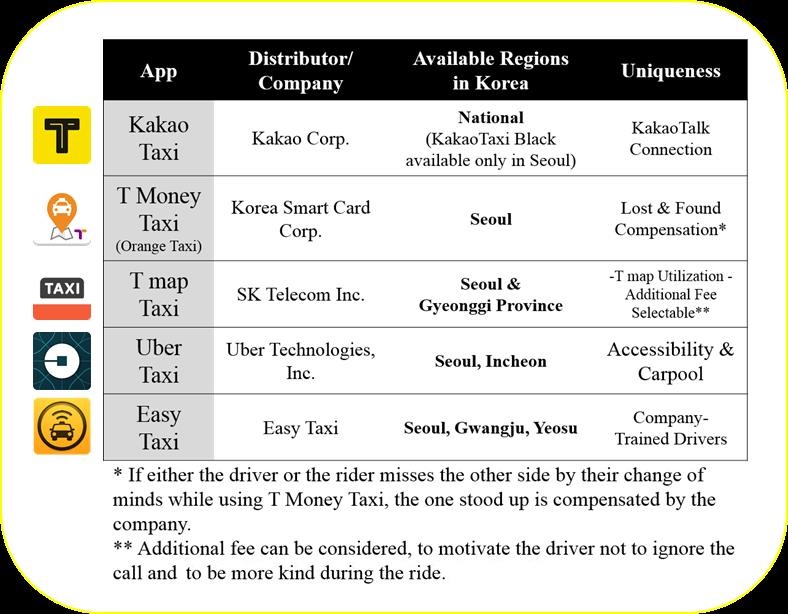
The taxi-hailing business in Korea has been long in the hands of "call-taxi" services alone . Now, the thing about transition from the traditional call-taxi to "app taxi" is that the familiarity certainly takes a big part in people's psychology. This is also where global and local companies' strategies made different turns. Uber, for one, has been the most recognized company from overseas. Its early strategy with Uber Taxi was to encourage the local residents to share their vehicles for people in need, for a price. However it ended with Uber creating hostility among the preexisting local taxi drivers while at the same time being wanted by the government for legal issues. On the other hand, Daum Kakao took an opposite approach; they succeeded in making MOU 's –Memorandums of Understanding- with local taxi corporations and connected Kakao Taxi to KakaoTalk, one of the top essential app in Korea. This way, more taxi drivers were willing to give trust in the company, and the riders were also eager to use the utility that came from the #1 messenger service in Korea.
Most of app taxis take on the following process almost the same. The majority of the apps need an account login and a phone number at the very first time. On the use, the apps would first automatically take use of the devices' GPS to pinpoint your current whereabouts and save it as the departing location. Then it will require you to input the destination, confirm the destination and the payment method if available, and receive acceptance from the driver. Now, in this business, it is getting grinding to find a unique function that really "kills" it, and it the features seem to have almost converged. For the safety of the passenger, many apps now show a profile of the driver, and leave a message that includes information of the ride to a person of choice. Some other shared functions include: driver rating, assigned taxi tracking, and using the location of the rider to automatically designating the best driver around.
Daum Kakao has been trying to improve people's lifestyle in various ways for a long time. In that perspective, this move on Kakao Taxi does not strike as impromptu, but more like a long-term plan finally hitting the surface, showing bits of what is to come next. This was also the first time the company stepped into actual online-to-offline (O2O) businesses. It was a monumental event that Daum Kakao showed an evident eagerness to get deeper into the lives of the people. While it is true that many drivers now earn a better profit with Kakao Taxi, a dark side does linger. One of the first victims was LimoTaxi. It was a startup that suggested providing a continuous flow of incentives to the drivers to stop taxis' refusal of customers. But the company surrendered to the size and hard-rock platform of Daum Kakao. Such a competition has also driven the particular ocean very red for the future startups, with funds all dried up. Daum Kakao has grown much with ideas to revamp the general’s lifestyle. Much heavier responsibility for the whole society should be considered from now on.
м Җмһ‘к¶Ңмһҗ © нҸ¬н•ӯкіөлҢҖмӢ л¬ё л¬ҙлӢЁм „мһ¬ л°Ҹ мһ¬л°°нҸ¬ кёҲм§Җ


